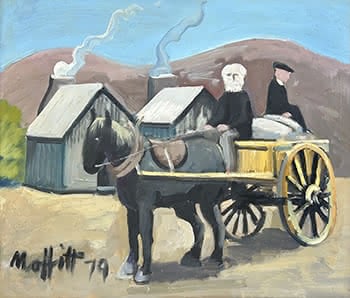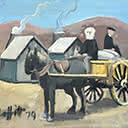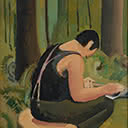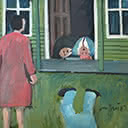Delivering to the Gold Fields
50.5 x 59 cm
est. $20,000 - 30,000
PROVENANCE Private Collection, Wellington
Simplicity was a distinctive feature of Trevor Moffitt's art along with his trademark impasto application of paint and solid, tonally modelled forms. Through his art Moffitt celebrated New Zealand folklore, immortalising events and participants in a way that no other artist has.
During the 1950s Moffitt attended the University of Canterbury School of Fine Art and was taught by Canterbury artists Bill Sutton and Russell Clark who were searching for an identifiable New Zealand style. Moffitt had his first solo exhibition, a show of Southland landscape paintings at the Invercargill Public Art Gallery in April 1960. In 1962 he commenced his Gold Miner series, based on his childhood experience of gold miners in Waikaia.
Often confrontational in its honesty, Moffitt's boldly direct expressionist style was considered almost primitive this leading to slow recognition of his works. Included in sale are four extraordinary works by the artist. Two of which are from Moffitt's Stanley Graham series from 1986 to 1987. During this period he produced 51 paintings, roughly a chronological description of Graham's life leading to the infamous shootings and manhunt.
This series is in part a commentary on a time when mental health was neglected and men were encourage to 'bottle things up'. Moffitt commented: The lessons of the man [i.e. Graham] are still to be learnt - that a lack of communication leads to violence in society.
The Stanley Graham series was exhibited at the Louise Beale Gallery in 1987. Moffitt sent up thirty works, four priced at $3,000 and the rest at $1,500, although six of these had already been pre-sold by the artist.
In the 1988 Winter edition of Art New Zealand Penny Orme wrote an article on Trevor Moffitt. While illustrated with images from the latest Stanley Graham series she also referenced the series Mackenzie, My Father's Life, and Artist as a Solo Father to highlight that; In depicting the courses of these lives, Moffitt manifests his concern for the human condition.





